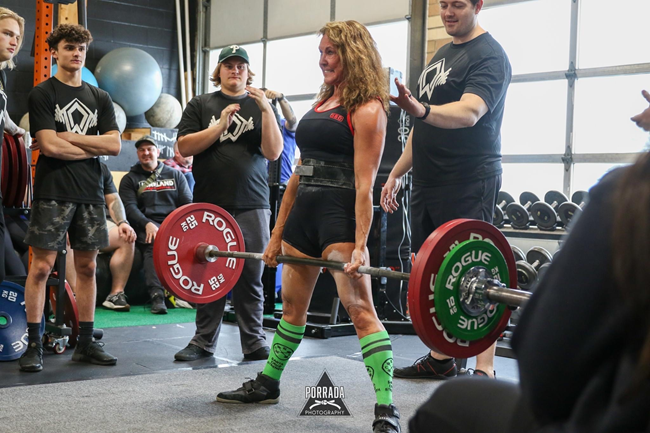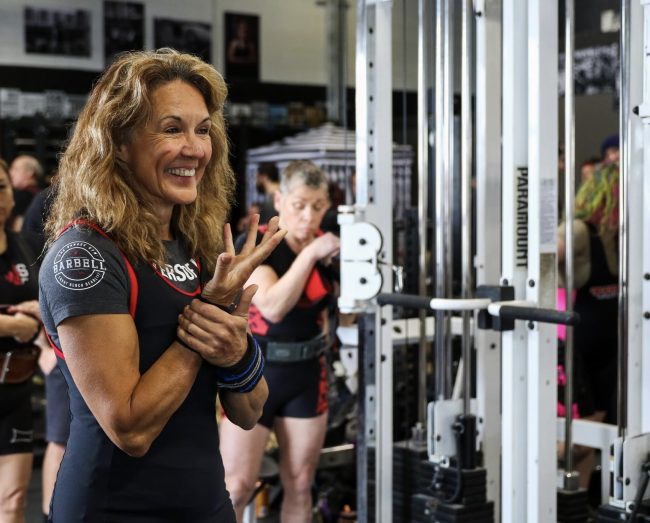
| Name |
| Debbie Hatch |
| Age |
| 59 |
| Weight Class |
| 50kgs |
| Squat PR: |
| 220.4lbs/99.9kgs official |
| Bench PR: |
| 152lbs/69kgs official |
| Deadlift PR: |
| 325.1.6lbs/147kgs official |
| Years lifting? |
| 35 years; 6 years powerlifting |
| How did you come to powerlifting or Olympic lifting? |
|
As a young girl growing up in Maine, my lifting was in the woodpile. I remember my father telling me how strong I was but that I was going to hurt myself. Somewhere along the way, life took over. Work. School. Kids. I bought a cheap weight bench with income tax money back when my children were little. I used to lift in the front entryway after they went to bed in the evening. Before there were magazines or programs for women, I read men’s muscle mags. I did their old school bodybuilding programs and also put on a nice 30 pounds by following their diets (raw eggs, oatmeal, and peanut butter in the blender). Oxygen magazine was my favorite when it hit the scene. I read every page and dreamed of standing on the figure stage. Made good on that goal when I was 48 years old. I competed for a couple of years and did okay. My last show was on my 50th birthday in Las Vegas. From figure, strength seemed to be a logical progression. I remember telling a few people I was going to do powerlifting. One coach laughed at me. You? A powerlifter?
Fast forward to October 2017. Me. A powerlifter. I competed in my first meet – an unsanctioned event in Omaha, Nebraska. The experience was amazing. I had never felt so strong an empowered. From there, it was USAPL and UPA meets. I’m a road-warrior who has spent over 200 days a year on the road for each of the past 14 years. I don’t pick meets based on federation. I pick them based on my schedule – what dates work well for me? Where am I going to be at that time?
|
| Do you have any previous athletic or lifting experience? | |
|
| Do you compete? Why or why not? If you compete, what do you like most about the competitions? | |
|
| Equipped or Raw? |
| Raw |
| Do you have a coach or trainer? In person or online? How did you find your trainer/program? Do you have any advice for women looking for a trainer? | |
|
| Where do you train? Gym, garage? |
| My favorite local gym is Omaha Barbell but I’m not home often enough to justify a membership. This is another consequence of my extensive business travel. Local gyms, classes, or groups just don’t fit. I have a membership to Anytime Fitness because there is a gym in 95% of the places I travel to and I can get in any time, day or night. I have a squat rack and bench in my basement (a Mother’s Day gift from my husband a few years ago). That comes in hand in a pinch. I personally prefer the gym over my basement though. I work harder and stay more focused outside of my own house. |
| What is the hardest part about beginning lifting as an older woman? | |
|
| How has lifting affected your health? |
| I have scoliosis and hip dysplasia (from a childhood injury). When I first started powerlifting, my max squat was 95 pounds and I was getting down to barely lateral. My doctor told me I had “no business lifting weights”. My max recorded squat is now 209, below lateral. Lifting has most definitely caused that positive change in mobility! Strength training also affects our mental health and emotional well-being. I know that I can work through heavy things – at the gym and in life. I am physically and emotionally stronger than I have ever been. My grandchildren want to “grow up to be strong like gramma”. |
| What would you tell women just beginning this journey? | |
|




